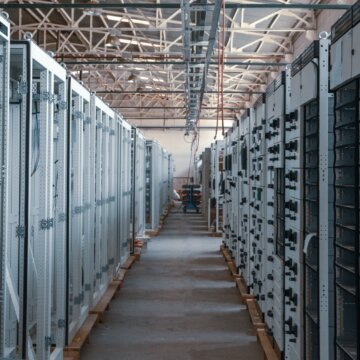05.June

As the power and profits of the giants of the digital economy continue to increase, the demand for more robust digital infrastructures capable of handling all the streaming, ordering and cloud computing flows common to this brave new world, also increases. Europe is no exception to this trend: European data center revenues are expected to increase by 57 percentfrom €11.1 billion to €17.5 billion by 2026. With data centers and hyperscale expected to thrive in Europe’s immediate future, recent developments in Ireland and the -Bas suggest that environmental considerations are progressing and destabilizing the plans of the heavyweight of Big Tech development.
In front of projections With Ireland expected to be the fastest growing hyperscale data center market in Western Europe through 2028, Irish officials decided to chart a new course last week. On 24 May 2022, Irish national electricity operator EirGrid announced that plans for 30 Irish data center projects would be abandoned due to concerns over national grid capacity. Currently, data centers drain more than 10 percent of the country’s electricity supply, a figure expected to rise to 30% by 2030. Such a rapid growth trend would all but destroy Ireland’s decarbonisation plans (to ensure that 80 percent of electricity comes from renewable energy by 2030) and also poses the threat of repeated power outages across the country.
EirGrid’s recent statement builds on a November 2021 decision by the Irish Commission for the Regulation of Utilities to introduce a de facto moratorium on data center construction until 2028 on the grounds that the country’s renewable energy capacity could not keep pace with new data center needs. Until last week, the assumption was that these limitations would only apply to the Dublin metropolitan area. Now the moratorium has expanded across the country, upsetting tech giants. Google, for example, said electricity restrictions in Ireland have made its data center development plans “impossible.”
Ultimately, Ireland chose to protect its ambitions to ensure 80 percent of its electricity comes from renewables by 2030 as part of its decarbonization efforts. These developments are a sign that the country’s climate objectives take priority over profits.
When it comes to continental Europe, the Netherlands is also facing backlash over its emergence as a data center powerhouse. In 2022, the Netherlands is home to 280 data centers, only behind Germany’s 484, but concentrated in a much smaller geography, and the country has plans to build 20 to 25 new or expanding projects in the near future. But recently, in February 2022, the Dutch government decided to suspend the construction of new hyperscale data centers across the country for nine months pending new regulations. All new projects have been banned with a few exceptions, the most notable being the Meta site in Zeewolde, which would be the largest in the country.
Among the many environmental concerns associated with the Zeewolde project was that of water quality: a spokesperson for LTO Noord, an association of local agricultural businesses, said that “water from the local canal would be used for cooling (of the data center), but to protect the cooling system. In the systems it will be treated with chemicals and then sent back into the canal…we have no guarantee it will be clean. In March 2022, Zeewolde won the international award attention after local activism and the defeat of local officials ultimately led Meta to “suspend” the project – a huge victory for the town’s 22,000 residents and environmental advocates around the world.
A European Commission study revealed that data centers accounted for 2.7 percent of the bloc’s electricity demand in 2018 and that this figure is expected to reach 3.2 percent of total demand by 2030 (not including cryptocurrency mining or data transmission networks). As Big Tech continues to expand its data centers across the continent and the EU moves to better regulate data center construction requirements, these developments in Ireland and the Netherlands suggest that environmental concerns have a chance to stem the profit-driven tide.
photo by Ismail Enes Ayhan
Call to action
GivePower provides solar power and clean water to developing communities around the world


